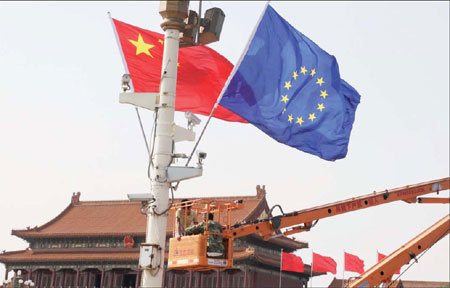Exporters in Europe put to the test
Updated: 2011-10-21 13:38
By Yan Yiqi (China Daily European Weekly)
|
|||||||||
|
 The European debt crisis will continue to affect China's exports in the fourth quarter. [Provided to China Daily] |
Bilateral trade pickup prospects bleak
Though China has surpassed the United States as the European Union's (EU) largest trade partner, several challenges still need to be overcome for further growth in bilateral trade between the two regions, analysts say.
According to the latest available information from Eurostat, the statistical office of the EU, trade between China and EU countries reached 35.6 billion euros in July.
The July numbers exceeded trade figures between the EU and the US by some 800 million euros, and accounted for over 13.4 percent of the region's total imports and exports.
However, the Eurostat figures did reveal that Sino-EU bilateral trade shrank for a second consecutive month in July and declined nearly 0.8 percent from the same period in 2010.
Analysts who track the Chinese economy have indicated that the worsening global economic environment will affect the fourth quarter and full year foreign trade numbers.
According to Customs data, Sino-EU trade value grew at a slower pace of 15.1 percent during September to $50.5 billion (36.7 billion euros) compared with a year earlier.
Bilateral trade value saw an annual growth of 21.3 percent to $265.9 billion in the first half, while the figure was up 25.3 percent in August from the same period last year.
In September, total exports from China to EU countries increased by just 9.8 percent year-on-year to $31.6 billion, compared with the 22.6 percent growth in August. Imports in September rose 25.5 percent year-on-year to $18.7 billion, while the annual growth was 32 percent in August.
"September export growth came in weaker than expected due to deteriorating demand from Europe, while import growth was in line with our expectations," Barclays Capital said in a recent research note.
China's exports to Italy dropped by 5.1 percent in September over the same period in 2010, while exports to France and Germany grew by just 1 percent, according to the report.
"The worsening debt crisis situation in the eurozone region has led to decreased external demand. This is something that China needs to be well-prepared for," says Wang Yong, a professor at the training center of the People's Bank of China, the nation's central bank.
Economists believe that the negative effect of the European debt crisis will be reflected in the overall trade figures between China and the EU.
"Although trade between China and Greece accounts for a very small proportion of Sino-EU trade, the widening debt crisis within the eurozone will still have strong negative impact on exports to the EU. The debt crisis may lead to a further depreciation of the euro against the yuan and impact China's exports in the near future," Wang says.
Wei Jianguo, former vice-minister of commerce, says that the European debt crisis will affect China's exports in the fourth quarter of this year, and may continue into the next year.
"China's export-reliant enterprises are facing their toughest time in several years. The possibility of a full-year trade deficit cannot be ruled out next year," Wei says.
China's trade surplus is likely to decline to between $50 billion and $100 billion in 2011, from $183 billion in 2010.
September's trade surplus narrowed for a second straight month to $14.5 billion with imports and exports faltering more than expected.
Chinese exporters have already found business with EU companies becoming more difficult than before, and are negative about future prospects.
"We do not see any chances of an improvement in overall conditions of the European markets by the end of the year. There will be a continuous appreciation of the yuan, with sales of Chinese products for medium- and low-end markets seeing further drops," says Sun Zhenhua, director of the European department at Haier Group, a leading home appliance maker.









